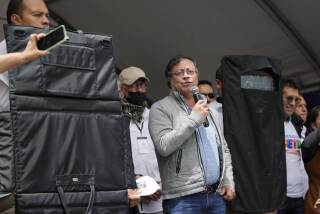President Trump ends controversial voter fraud commission

One day after disbanding his troubled voter fraud commission without any findings of fraud, President Trump continued to call the U.S. voting system “rigged” and said states should require that Americans have voter-identification cards. (Jan. 4, 201
President Trump signed an executive order late Wednesday ending the voter fraud commission he launched last year as the panel faces a flurry of lawsuits and criticism from Democrats and Republicans alike.
Trump signed the order disbanding the commission “rather than engage in endless legal battles at taxpayer expense,” White House Press Secretary Sarah Huckabee Sanders said in a statement.
The Presidential Advisory Commission on Election Integrity, created by executive order in May with the stated goal of restoring confidence and integrity in the electoral process, has faced a barrage of lawsuits in recent months over privacy concerns, as the commission sought personal data on voters across the country.
Trump has alleged that between 3 million and 5 million illegal votes were cast in the 2016 presidential election in which his Democratic opponent, Hillary Clinton, garnered nearly 3 million more overall votes, though Trump won a majority in the electoral college.
Most analysts have said that there has been little or no evidence of voter fraud in U.S. elections.
The president tapped Vice President Mike Pence to serve as chairman, with the job of vice chairman going to Kansas Secretary of State Kris Kobach, a Republican who helped create some of the controversial voter identification laws that critics say disproportionately affect minorities. Of the commission’s 13 original members, eight are Republicans and five are Democrats.
The commission had convened twice — in Washington in July and New Hampshire in September — and heard testimony about how to better improve the voting process and registration.
Last month, Maine’s secretary of state, Matthew Dunlap, a Democrat on the panel, filed suit against the commission alleging he was denied full access to the internal information he needed to fully participate in the commission’s work. A federal judge ruled in his favor.
The commission has also faced several lawsuits over privacy concerns as it requested voter names, addresses and other data in all 50 states — though officials in 15 states, some where Republicans oversee elections, had reportedly denied the requests.
“This came without warning, but not really as a surprise,” Dunlap said on Wednesday. “It is a bit disappointing because I was hoping our work would put these voter fraud allegations to rest.”
The nonpartisan U.S. Government Accountability Office announced in the fall that it had accepted a request from Democratic lawmakers to review the commission.
In an Oct. 18 letter requesting the investigation, Democratic Sens. Michael Bennet of Colorado, Cory Booker of New Jersey and Amy Klobuchar of Minnesota wrote that the manner in which the commission was conducting its work “will prevent the public from a full and transparent understanding of the commission’s conclusions and unnecessarily diminish confidence in our democratic process.”
A review by the agency was expected to be completed in the months ahead.
Michael Waldman, president of the nonpartisan Brennan Center for Justice at the NYU School of Law, said Wednesday that the “commission started as a tragedy and ended as a farce.”
“It was a colossal waste of taxpayer money from the very beginning. It failed to find any evidence of the millions of illegal voters claimed by President Trump,” he said in a statement. “But this should be more than just a somewhat-comic ending to a misguided effort. The claim of widespread voter fraud in the United States is, in fact, fraud. The demise of this commission should put this issue to rest.”
Twitter: @kurtisalee
UPDATES:
5:30 p.m.: This story was updated with comment on the decision to disband the commission.
This story was originally published at 5:10 p.m.
More to Read
Sign up for Essential California
The most important California stories and recommendations in your inbox every morning.
You may occasionally receive promotional content from the Los Angeles Times.











